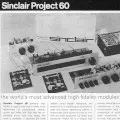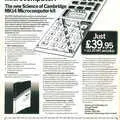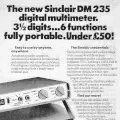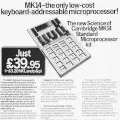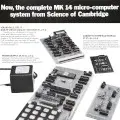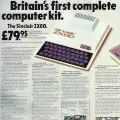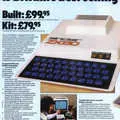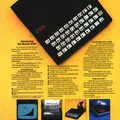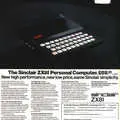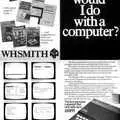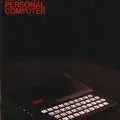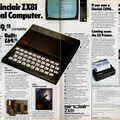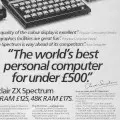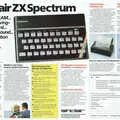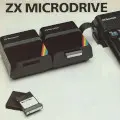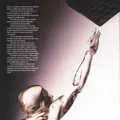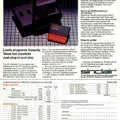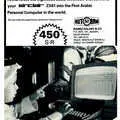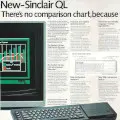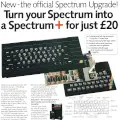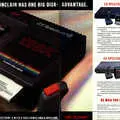
Sinclair Advert - October 1980
From Personal Computer World
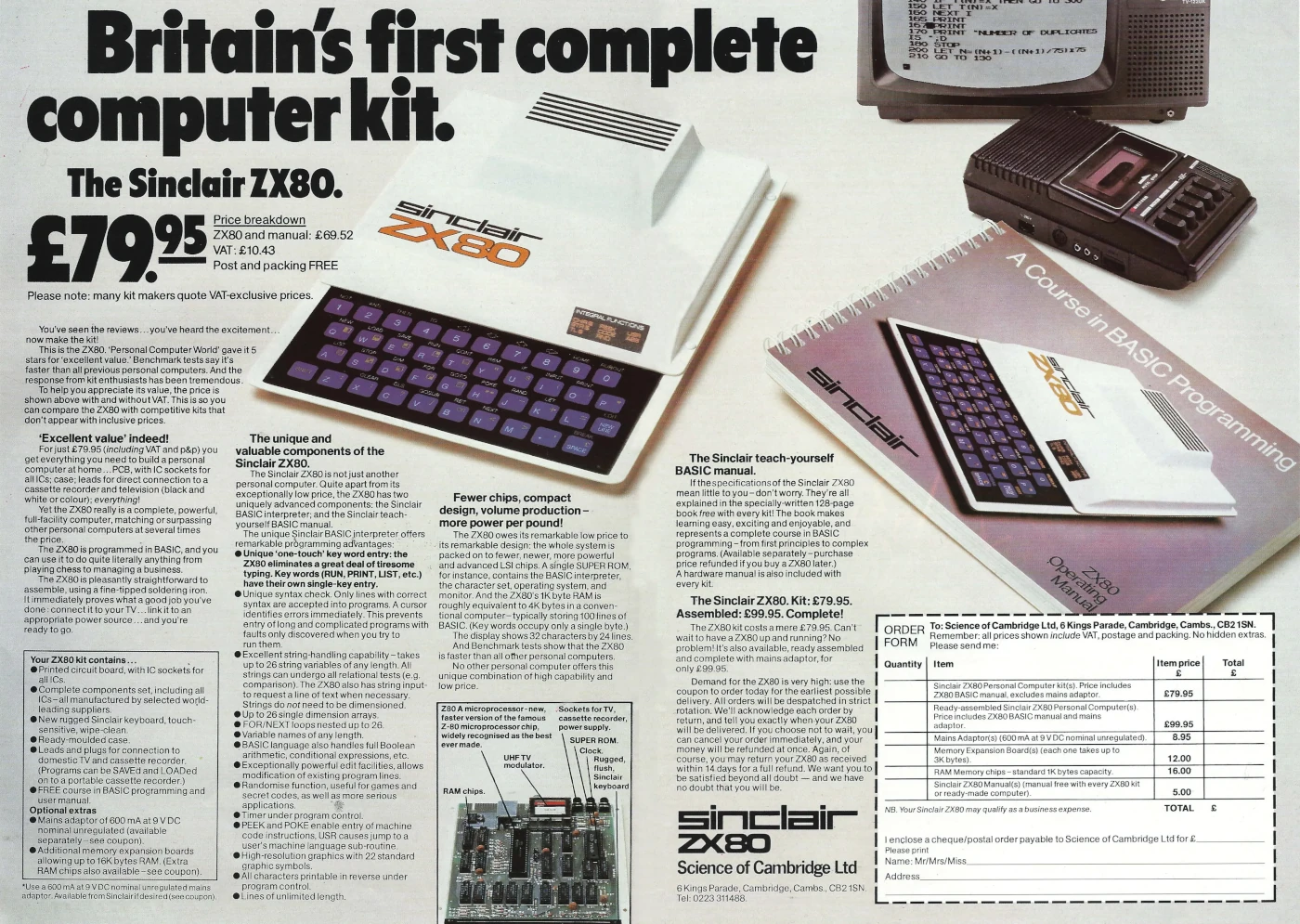
Britain's first complete computer kit - Sinclair ZX80
The ZX80, designed by Jim Westwood and launched on January 29th 1980, was Sinclair's first real computer and was the machine that helped really start the UK's home computer industry.
It had many issues - not just the hard-to-use membrane keyboard, but also the fact that video and keyboard handling was all done by the CPU - an NEC 780-1, which was a clone of the popular Z80.
This meant that every time a key was pressed, the screen display would disappear. It was also prone to overheating.
However, it was incredibly cheap for its day, being only £80 (or about £500 in 2025 terms) in kit form, or £99.95 (£620) assembled.
Both prices were below what Sinclair determined was the "psychological price barrier" of £100, and below anything else on the market - including bare-board and kit micros.
It sold over 100,000 units, of which 60% were exported[1].
The ZX80 was reviewed by Personal Computer World's David Tebbut, who reported that the machine's BASIC had been well thought-out, and that "while it lacks some of the elegance and sophistication of some of the bigger machines, it's a very usable version of the language". He concluded:
"Having just read Science of Cambridge's claims for the machine again, I have to say I agree with most of them. The ZX80 appears to be a well thought-out machine both in terms of hardware and software. It has an excellent editor and interpreter which between them help you avoid all sorts of nasty pitfalls. I hope Mr. Sinclair and his merry men of Cambridge can cope with the expected flood of orders".
It was made by Science of Cambridge, whose ancestor was Sinclair Radionics, a company which had a bit of a name in the electronics world, with its hifi components, miniature radios, pocket calculators, the infamous "black watch", and the world's smallest TV.
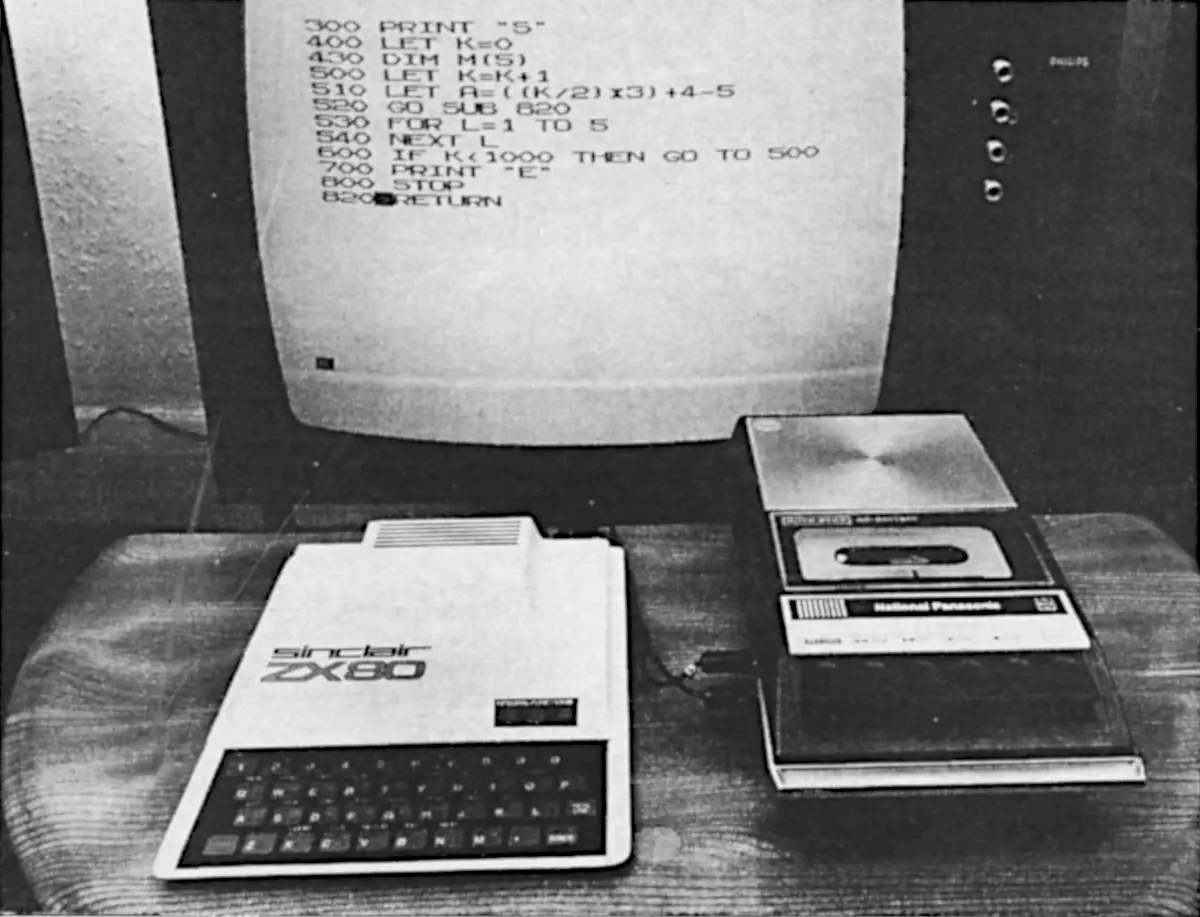
The ZX80 undergoing Personal Computer World's bench test, from Personal Computer World April 1980
The Black Watch - the first affordable LCD watch in the UK - was first announced in September 1975 but was beset by production difficulties.
It could be destroyed by static-generating nylon carpets, whilst nylon shirts also caused problems in use. The watches broke down when used in cold weather, they ran at different speeds depending upon the ambient temperature and the battery life could be measured in days[2].
It was however the first digital watch to have all its components combined into a single chip, the manufacture of which was to be farmed out to Mullard. This once-British company - famous for its valves - had become a wholly-owned subsidiary of the Dutch Philips company in 1927, although it kept its name until 1988.
However, somewhat late in the day, word came back from Philips' Eindhoven headquarters that Mullard was backing out as the company did not think there was a future in digital watches, even though it could have made the watch "if it wanted to".
The job was then passed on to ITT, but this lost Sinclair a crucial 18-month head-start in the market which had been eagerly expecting a £30 watch instead of the £80 they cost previously.
This was especially damaging as Sinclair's business model largely relied on being first to market with innovative new products.
ITT, which Uncle Clive reckoned wasn't being especially good at keeping him informed about what was going on, was having serious problems getting a decent yield of the all-in-one watch chips, on top of which all the static and temperature problems were coming to light.
Sinclair was eventually paid £50,000 (£524,900 in 2025 money) by way of compensation, but it quietly dropped plans to use the watch as its executive Christmas gift, said to have been planned for presentation along with a message "Best of British technology - ITT and Sinclair"[3].
The financial problems caused by this fiasco, which came at a time when the company was also investing heavily in its flat-screen television, MicroVision, led to a bail out from the National Enterprise Board, which was effectively a part-nationalisation.
The extra investment was needed in order to continue the development of the pocket television - the alternative being to abandon it completely - but the partnership broke up when pro-television leader of the NEB, Lord Ryder, left and his replacements wanted to see Sinclair concentrate on its existing electronic-instruments business instead.
The NEB claimed that development of the tiny television had already cost them nearly £8 million. The MicroVision was eventually sold to Hong Kong's Binatone, which found it couldn't make a profit on it either.
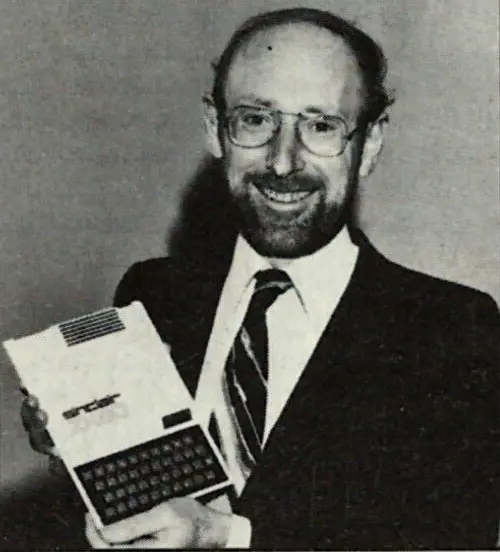
Sinclair, looking like a new dad after 24 hours in the labour ward, launches his new baby - the ZX80, © Personal Computer World March 1980Not long afterwards, Sinclair left Radionics with a modest golden handshake and moved to his "lifebelt" company Science of Cambridge[4], which he had already got right-hand-man Chris Curry to get going.
This company would later trade as Sinclair Research and went on to sell the ZX80, ZX81 and popular ZX Spectrum models, whilst eventually losing out to Acorn in the race to provide the BBC contract.
Acorn was co-founded by Curry and the two companies would become bitter rivals, often slagging each other off in the press[5][6].
Resentment over the BBC contract ran deep, and as late as 1987 - six years later - Sir Clive was still grumbling about it, calling the move "outrageous" and saying "We were the most successful company at the time. Losing the BBC contract was very damaging. We lost a large Japanese deal after that".
The BBC explained that it had "gathered specifications from education experts and then took the package to seven companies". Six made offers and the contract was awarded purely on technical grounds[7].
The ZX80 was also apocryphally the computer that contributed to Jack Tramiel's decision to launch the VIC-20 - after he saw one he was convinced that Commodore could do something much better than a "plastic door-stop".
Sinclair was eventually sold to Amstrad in 1986, becoming another casualty of the great computer-company shake-out of the mid 1980s.
---
Clive Sinclair, despite being a keen mathematician and having a lengthy career in electronics already behind him, was perhaps an unlikely father of the UK computer industry, as it was said that he laughed at the idea of using a computer himself. He even eschewed electronic calculators and apparently preferred to work in his head or use a slide rule.
Interviewed in July 1982's Practical Computing, he only grudglingly accepted that computers had a use, suggesting that he was all for the simple life but that:
"There are certain tools around that are useful at times. [Computers] simplify buying an airline ticket or getting cash at any time of day or night - these are simplifying things no matter what sort of life we lead".
He was also not of the view that computers could increase human intelligence or build a better world, suggesting that the fact that computing was an intellectually-demanding skill did not lead to humans getting brainier, but rather they were getting "Dimmer, if anything".
His only real interest in computers seemed to be not in their value as a tool, but simply that they provided an interesting source of design problems that needed to be solved. Sinclair had said much the same about his experience on designing the flat-screen TV, where "The most interesting job was mathematical" and that:
"Most of the interesting jobs cannot be done on a computer. There was a curiosity of the flat tube's design which would not come out of the computer analysis, so I had to do it. That is what I like - problem solving".
Sinclair had also observed that the greatest research and development funding went into defence and military systems, but he himself was of a view that the engineer "should have a conscience, and a consciousness of the consequences of his inventions".
This a view which strongly echoed Joseph Weizenbaum's suggestion in a 1979 essay, published in "The Computer Age: A Twenty Year View", that technologists who put [computer] tools at the disposal of a morally-deficient society should not be absolved of the responsibility for them[8].
Weizenbaum - considered as one of the fathers of Artificial Intelligence (despite becoming a critic of it)[9] - had also suggested that
"The frequently-used arguments about the neutrality of computers and the inability of programs to exploit or correct social deficiencies are an attempt to absolve programs from responsibility for the harm they cause, just as bullets are not responsible for the people they kill"
Sinclair had been known to have turned down military work as he was "worried about its implications"[10].
Date created: 01 July 2012
Last updated: 11 December 2024
Hint: use left and right cursor keys to navigate between adverts.
Sources
Text and otherwise-uncredited photos © nosher.net 2025. Dollar/GBP conversions, where used, assume $1.50 to £1. "Now" prices are calculated dynamically using average RPI per year.
